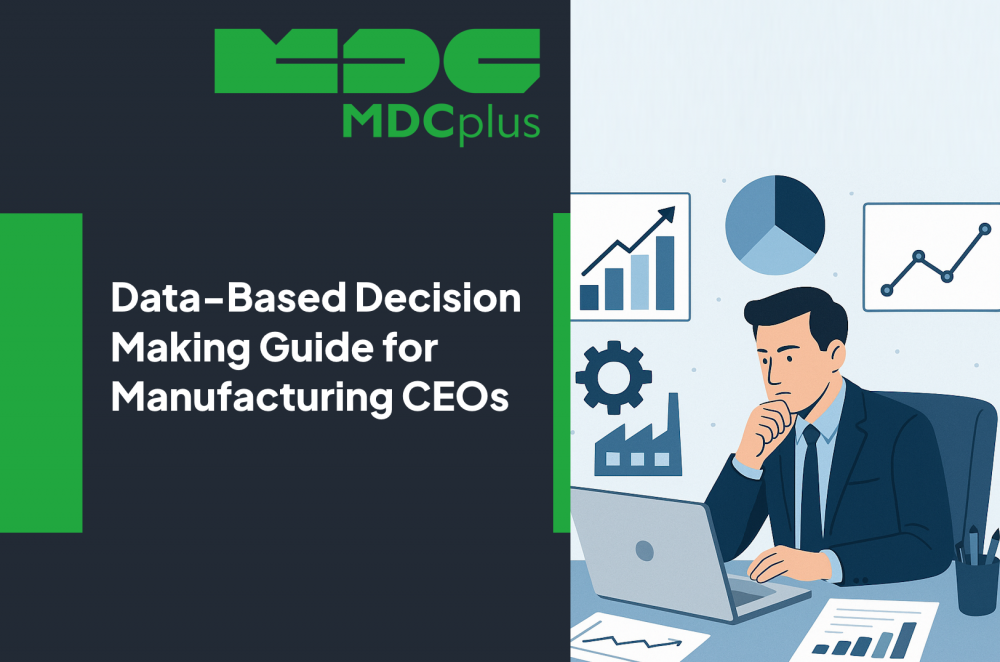Data-driven decisions made easier
Get started with MDCplusData-Based Decision Making Guide for Manufacturing CEOs
Opening Insight: Why Strategy Now Demands Data
In a rapidly shifting global market, manufacturing leaders can no longer rely on experience alone. The rise of digital transformation and Industry 4.0 technologies has redefined what it means to lead effectively. At the center of this shift is one undeniable truth: strategic decisions must be data-driven to remain competitive.
The New Standard: What It Means to Be Data-Driven
At its core, data-driven strategic decision-making refers to using verified, timely data to guide high-level business choices. This approach emphasizes:
- Objectivity: Decisions are grounded in facts, not assumptions.
- Scalability: Insights are drawn from across departments and apply company-wide.
- Proactivity: Early detection of trends, risks, and opportunities shapes strategic direction before issues arise.
How Modern Manufacturers Structure Strategic Decisions
To build a data-driven foundation, successful manufacturers align their strategic process across five key pillars:
-
Data Collection and Integration
Data must flow from every layer of the business—machines, supply chains, financial systems, and customer touchpoints. -
Advanced Analytics
With AI and machine learning, businesses shift from descriptive reports to predictive insights that anticipate trends and disruptions. -
Visualization and Reporting
Dashboards and real-time visualization tools transform raw numbers into actionable intelligence for leadership teams. -
Strategy Development and Adjustment
Business plans and resource allocations evolve continuously, based on the latest insights. -
Continuous Improvement
A feedback loop ensures every strategic cycle becomes more informed, more agile, and more aligned with business goals.
Why CEOs Must Lead the Data Transformation
Executives who embrace data don’t just optimize—they outpace. The benefits of data-driven strategy for manufacturing leaders include:
- Faster response to market volatility
- Lean, efficient operations that drive profitability
- Deeper alignment between production capabilities and business goals
- Proactive risk identification and mitigation
In a world where uncertainty is the norm, data delivers clarity.
The Five Types of Data That Drive Strategy
To lead effectively, CEOs must understand which data sets shape the bigger picture:
- Financial Data – Cost structures, margins, ROI trends
- Production Data – Machine performance, throughput, downtime
- Quality Data – Yield rates, defect metrics, audit results
- Customer Data – Order patterns, forecast accuracy, satisfaction levels
- Workforce Data – Labor efficiency, absenteeism, skill alignment
Each type tells part of the story. Together, they illuminate the whole operation.
Barriers to Data-Driven Leadership
Despite the potential, many manufacturers struggle to operationalize data. Common challenges include:
- Siloed systems that prevent unified insights
- Limited data literacy at the executive and managerial level
- Security and compliance risks surrounding sensitive information
Overcoming these hurdles requires not just technology, but culture change.
What Successful CEOs Do Differently
Executives who lead successful data-driven transformations share key behaviors:
- Champion a culture of data literacy across all departments
- Invest in scalable analytics tools with AI and automation capabilities
- Establish clear governance around data privacy and compliance
- Routinely re-evaluate strategy based on real-time performance insights
They view data not as a support tool but as a core strategic asset.
Conclusion: Strategy in the Age of Intelligence
The future of manufacturing leadership belongs to those who see data as leverage, not just logistics. As Industry 4.0 technologies continue to evolve, the ability to translate insight into action will define the most successful CEOs.
For manufacturing leaders, the next strategic leap isn’t just about digital tools—it’s about adopting a mindset where decisions are no longer driven by instinct alone, but by intelligence at scale.
About MDCplus
Our key features are real-time machine monitoring for swift issue resolution, power consumption tracking to promote sustainability, computerized maintenance management to reduce downtime, and vibration diagnostics for predictive maintenance. MDCplus's solutions are tailored for diverse industries, including aerospace, automotive, precision machining, and heavy industry. By delivering actionable insights and fostering seamless integration, we empower manufacturers to boost Overall Equipment Effectiveness (OEE), reduce operational costs, and achieve sustainable growth along with future planning.
Ready to increase your OEE, get clearer vision of your shop floor, and predict sustainably?
Other articles
While both involve structured review and analysis, their objectives, scope, and outcomes differ significantly. This article exploring this topic further.
